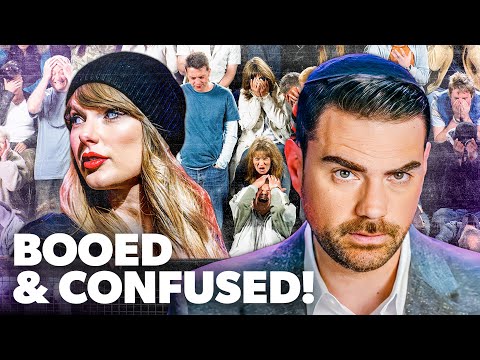During the recent Super Bowl, a moment unfolded that some are labeling “chilling,” while others find it downright amusing. Taylor Swift, the pop sensation known for her lyrical musings about heartbreak and triumph, was booed by a crowd of football fans. Amidst the high-energy atmosphere of one of America’s most beloved sporting events, her reception sharply contrasted with the applause received by former President Donald Trump, who also made an appearance that night. This peculiar dynamic has sparked discussions about celebrity culture, political machinations, and the shifting landscapes of American entertainment.
To the average football fan, Swift’s booing might have felt justified. Many see her as a recent transplant to the football world, largely because of her new relationship with Kansas City Chiefs tight end Travis Kelce. The skepticism toward Swift is not rooted in her musical talent but in a pervasive perception that she is leveraging her celebrity status for attention. Football fans are there for the game, not a pop star whose connection to the sport feels, at best, opportunistic. The uproarious booing wasn’t a personal attack but a collective dismissal of what many consider celebrity artifice intruding into their cherished pastime.
Glamour magazine calls this booing a disturbing symptom of rising misogyny, but is that truly the case? Perhaps it’s more associated with Swift’s brand rather than her gender. Swift has built her career on a narrative of victimhood, often juxtaposed with a life of remarkable privilege. This dynamic creates a peculiar disconnect that some fans find irritating. In a space designed for celebration and camaraderie, fans are left wondering why they should invest their emotions in a pop star who seems to play the victim while residing in a multi-million-dollar estate. When comparing this to the warm reception for Trump, it becomes clear that the reactions stem from more than just misogynistic attitudes; they reflect a discontent with real-life figures who don’t seem to connect to the average American experience.
Moreover, while Swift embodies a particular modern celebrity persona, Trump’s engagement with the crowd resonated with many attending the game. His popularity at the Super Bowl reflects an appreciation for traditional American values, which some feel has been overshadowed by celebrity culture. The stark contrast in reactions captures a larger schism; millions across the nation lean toward a nostalgic sense of patriotism while others admire figures like Swift who, despite their wealth, often critique those very values.
As Swift’s much-discussed appearance faded into the background, another performance stole the spotlight: Kendrick Lamar’s halftime show. Reports later claimed that his act was laced with “coded messaging” aimed at addressing socio-political issues. However, the reception was lukewarm at best. While some analysts read deep into the symbolism—pointing to various artistic elements that intended to critique American society—most fans were more interested in the spectacle than the messaging. In essence, much like Swift’s reception, Lamar’s artistic expression didn’t land in the way he might have hoped. If a performance meant to disrupt goes unnoticed, can it truly make an impact?
In the grand scheme of things, the Super Bowl presents a unique microcosm of American culture. The sporting event juxtaposes the world of politics with pop culture, revealing how celebrities can fall flat when attempting to engage with a different audience. It demonstrates a growing divide where traditional American values are celebrated while contemporary celebrity announcements are often met with skepticism or outright disdain. Perhaps the booing of Taylor Swift was not a reflection of misogyny, but rather a collective cheer from fans who are simply tired of being marketed to by those not deeply rooted in their culture. The lesson here may well be that when you enter a space that has its own set of values, it’s wise to leave the spectacle at the door and embrace the game instead.



